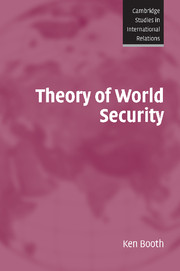2 - Thinking theory critically
Published online by Cambridge University Press: 05 June 2012
Summary
Oh, this ‘sublime silence of eternity’ in which so many screams have faded away unheard. It rings within me so strongly that I have no special corner of my heart reserved for the ghetto: I am at home wherever in the world there are clouds, birds and human tears.
Rosa Luxemburg, at the end of her lifeThe previous chapter identified where a critical theory of security should start: a global political context in which ‘so many screams have faded away unheard’. A radically different world politics is conceivable, though its complete achievement may ultimately elude humankind. International politics must become the art of the impossible, for the alternative is almost too unpleasant to contemplate. With this in mind, the present chapter begins to sketch a map of sites of ideas to help create the political conditions for a more secure future. These ideas are not to be found in the national ghettos of realism, but in the cosmopolitan spirit of the unfinished work of the Enlightenment.
Critical global theorising
His attitude toward the world was neither positive nor negative, but radically critical.
Hannah Arendt on Gotthold LessingThe theoretical framework developed in this book derives from a body of thought I call critical global theorising. These ideas, for the most part, were inspired by the Enlightenment, a profoundly significant episode in world history that took place primarily in Europe in the eighteenth century, though its key ideas were not exclusive to Europe at that time in origin or relevance.
- Type
- Chapter
- Information
- Theory of World Security , pp. 37 - 92Publisher: Cambridge University PressPrint publication year: 2007



